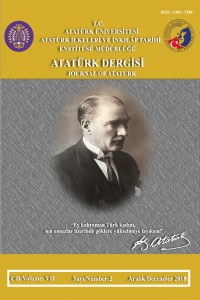Abstract
Mondros
Mütarekesi’nden sonra başlayan işgaller çerçevesinde Anadolu’da demiryolları
hatlarının kavşak noktalarından biri olan Eskişehir de İtilaf Devletleri
tarafından kontrol altına alındı. Gerek uzun savaş yıllarının, gerekse yaşanan
işgalin bir sonucu olarak Eskişehir’de de diğer Anadolu şehirlerinde olduğu
gibi ciddi toplumsal sorunlar ortaya çıktı. Gayrimüslim ve Müslüman ahali
arasındaki soğukluk ve İslam ahalinin içine düştüğü manevi çöküntü sonucunda
yaşanan zührevi hastalıklar gibi problemler nedeniyle harekete geçen şehrin
yönetici ve ileri gelenleri Islah-ı Ahvâl ve Ahlak Komisyonu’nu kurdular. Bu
komisyonun kurulma gerekçesini içeren Esbâb-ı Mucibe Layihası ve komisyonun Nizamnamesi
Dâhiliye Nezaretine sunuldu. Dâhiliye Nezareti, tayin ettiği mülkiye müfettişinin
yaptığı değerlendirme sonucunda komisyonun kurulmasını reddetti. Bu ret
kararına rağmen, hazırlanan nizamname ve konu ile ilgili yazışmalar mütareke
döneminde yaşanan toplumsal sorunların anlaşılması açısından oldukça önemlidir.
References
- BAKAR, Bülent, Esir Şehrin Misafirleri: Beyaz Ruslar, Tarihçi Kitabevi, İstanbul, 20152.
- CRİSS, Bilge, İşgal Altında İstanbul, 1918-1923, İletişim Yayınları, İstanbul, 20076.
- ENİS, Selahaddin, Zaniyeler, Orhaniye Matbaası, İstanbul, 1340.
- SARIKOYUNCU, Ali, ÖNDER, Selahattin, ERŞAN, Mesut, Millî Mücadelede Eskişehir, Osman Gazi Üniversitesi Yayınları, Eskişehir, 2002.
- TEMEL, Mehmet, İşgal Yıllarında İstanbul’un Sosyal Durumu, Kültür Bakanlığı Yayınları, Ankara, 2008.
- TURAN, Şerafettin, Türk Devrim Tarihi, 1. Kitap, İmparatorluğun Çöküşünden Ulusal Direnişe, 2. Baskı, Bilgi Yayınevi, İstanbul, 2004.
- KOYLU, Zafer, “Eskişehir Mutasarrıfı Mustafa Hilmi Bey’in Öldürülmesi”, Ankara Üniversitesi Türk İnkılâp Tarihi Enstitüsü Atatürk Yolu Dergisi, S.46, (Güz 2010), ss.425-455.
- ÖZER, İlbeyi, “Mütareke ve İşgal Yıllarında Osmanlı Devleti’nde Görülen Sosyal Çöküntü ve Toplumsal Yaşam”, Osmanlı Tarihi Araştırma ve Uygulama Merkezi Dergisi OTAM, XIV/14, 2003, ss. 247-271.
- TOPRAK, Zafer, “Meşrutiyet’ten Cumhuriyet’e Müstehcen Avam Edebiyatı”, Tarih ve Toplum, S. 38, (Şubat-1987), ss. 25-28.
IN ESKISEHIR IMPROVEMENT OF STATUS AND ETHICS COMISSION THE EFFORT OF INSTALLATION AND THE RESULT (1919)
Abstract
Within the framework of the occupations that started
after the Armistice of Mondros, Eskişehir, which is one of the junction points
of the railway lines in Anatolia, was controlled by the Entente States. As a
result of both the long war years and the occupation, serious social problems
emerged in Eskişehir as in other Anatolian cities too. As the result of
coldness between non-Muslim and Muslim people and the moral collapse
experienced by the Islamic population due to problems such as venereal
diseases, the rulers and dignitaries of the city has established the Improvement
of Status and Ethics Commission. Memorandum of Statement of Reasons
including the reason for the establishment of this commission and the
regulations of the commission were submitted to the Ministry of Internal
Affairs. The Ministry of Internal Affairs refused the establishment of the
commission as the result of the assessment made by the Property Inspector thay
they appointed. In spite of this rejection decision, the prepared constitution
and correspondence related to the subject are very important in terms of
understanding the social problems experienced during the armistice period.
References
- BAKAR, Bülent, Esir Şehrin Misafirleri: Beyaz Ruslar, Tarihçi Kitabevi, İstanbul, 20152.
- CRİSS, Bilge, İşgal Altında İstanbul, 1918-1923, İletişim Yayınları, İstanbul, 20076.
- ENİS, Selahaddin, Zaniyeler, Orhaniye Matbaası, İstanbul, 1340.
- SARIKOYUNCU, Ali, ÖNDER, Selahattin, ERŞAN, Mesut, Millî Mücadelede Eskişehir, Osman Gazi Üniversitesi Yayınları, Eskişehir, 2002.
- TEMEL, Mehmet, İşgal Yıllarında İstanbul’un Sosyal Durumu, Kültür Bakanlığı Yayınları, Ankara, 2008.
- TURAN, Şerafettin, Türk Devrim Tarihi, 1. Kitap, İmparatorluğun Çöküşünden Ulusal Direnişe, 2. Baskı, Bilgi Yayınevi, İstanbul, 2004.
- KOYLU, Zafer, “Eskişehir Mutasarrıfı Mustafa Hilmi Bey’in Öldürülmesi”, Ankara Üniversitesi Türk İnkılâp Tarihi Enstitüsü Atatürk Yolu Dergisi, S.46, (Güz 2010), ss.425-455.
- ÖZER, İlbeyi, “Mütareke ve İşgal Yıllarında Osmanlı Devleti’nde Görülen Sosyal Çöküntü ve Toplumsal Yaşam”, Osmanlı Tarihi Araştırma ve Uygulama Merkezi Dergisi OTAM, XIV/14, 2003, ss. 247-271.
- TOPRAK, Zafer, “Meşrutiyet’ten Cumhuriyet’e Müstehcen Avam Edebiyatı”, Tarih ve Toplum, S. 38, (Şubat-1987), ss. 25-28.
Details
| Primary Language | Turkish |
|---|---|
| Journal Section | Makaleler |
| Authors | |
| Publication Date | December 27, 2018 |
| Published in Issue | Year 2018 Volume: 7 Issue: 2 |
Cite
Content of this journal is licensed under a Creative Commons Attribution NonCommercial 4.0 International License


